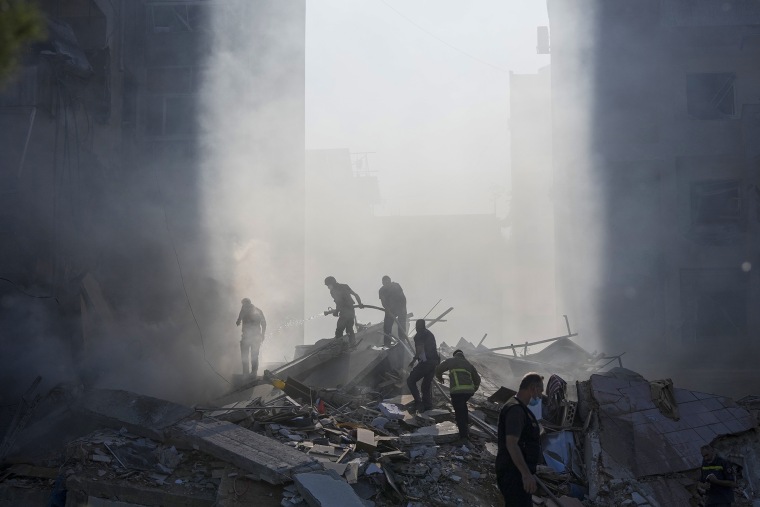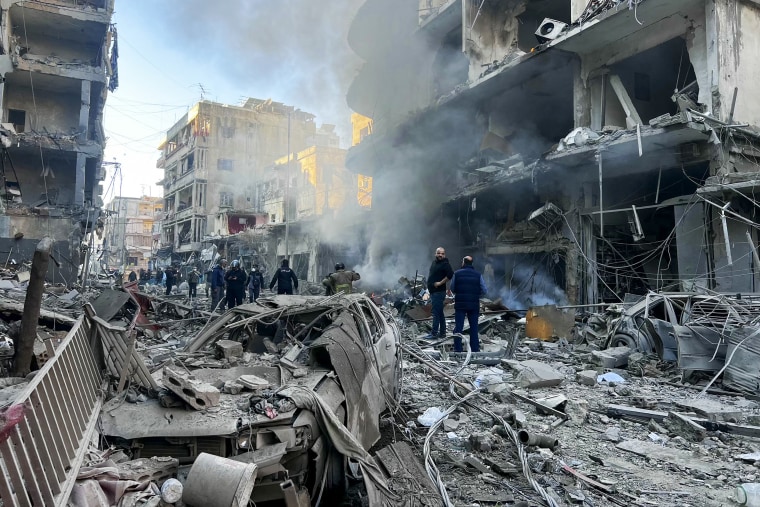BEIRUT — An Israeli airstrike flattened a building near one of Beirut’s busiest traffic junctions Friday, shaking the Lebanese capital as Israel kept up its intensified bombardment even as diplomacy aimed at securing a cease-fire showed tentative signs of progress.
Pressing its offensive against the Iran-backed militant group, Israel has this week stepped up airstrikes against the Hezbollah-controlled southern suburbs — an escalation that has coincided with indications of movement in U.S.-led diplomatic contacts toward ending the conflict.
One of several airstrikes on Friday morning, the attack struck near the Tayouneh junction in an area where the suburbs meet other parts of the city, a more central target than most that Israel has hit. The Israeli military issued a warning on social media identifying buildings there and telling residents to evacuate, saying they were near Hezbollah facilities.

Cease-fire proposal moves forward
In a more hopeful sign, the U.S. ambassador to Lebanon submitted a draft truce proposal to halt fighting between Hezbollah and Israel to Lebanon’s parliament speaker Nabih Berri on Thursday, an adviser to the speaker, Ali Hamdan, told NBC News.
The Reuters news agency first reported the proposal.Hopes have been buoyed before, notably late last month when Lebanon’s prime minister expressed optimism a cease-fire could be reached before the end of October.
But Israel expects that over the weekend Hezbollah will give its response, an Israeli official tells NBC News.
The proposal calls for the withdrawal of Israeli forces from Lebanon in return for Hezbollah fighters withdrawing to north of the Litani River, which runs about 20 miles from Lebanon’s southern border. United Nations peacekeepers and Lebanese troops would be tasked with monitoring and enforcing the deal.
The Israeli official said a key sticking point is the question of enforcement. Israel says it’s looking for language in the deal that would allow it to resume attacking if Lebanese and U.N. authorities do not take action in the event Hezbollah violates the agreement. Such language is likely to be a non-starter for Hezbollah.

Senior Iranian official Ali Larijani, an advisor to Iran’s supreme leader, met Berri and Lebanon’s caretaker Prime Minister Najib Mikati in Beirut on Friday and pledged his country’s unwavering support for Lebanon.
Speaking to reporters later after also meeting Berri, Larijani said Berri had provided him with “good clarifications.”
“We are not looking to sabotage anything,” Larijani said, responding to a reporter who asked whether he had come to Beirut to wreck the American draft.
“We are after a solution to the problems. We support in all circumstances the Lebanese government. Those who are disrupting are Netanyahu and his people,” Larijani said, referring to Israeli Prime Minister Benjamin Netanyahu.
The U.S. proposal has 13 points that have all been agreed on, an official from Berri’s office told NBC News. Now the key is fine-tuning the wording, that official said.
The proposal calls for the full implementation of U.N. Security Council Resolution 1701, which ended a 2006 war between Israel and Hezbollah, the official said. It also calls for the series of steps outlined above to be taken in the first 60 days, according to the source.
On the Lebanese side, the source said, the fear is that Israel will pull out at the last moment, as it did at the end of September when Israel backed out and assassinated Hezbollah chief Hassan Nasrallah.
The source said that critical talks would be held over the next 72 hours with an announcement possibly — and hopefully — coming next week.
The Biden administration is making a push for peace in the waning time before President-elect Donald Trump takes office in January.
Months of U.S. efforts to broker a deal between Washington’s ally Israel and Hezbollah have so far failed. Israel launched a stepped-up air and ground campaign in Lebanon in late September after nearly a year of cross-border clashes in parallel with the Gaza war.
In another potentially promising sign, a senior Lebanese official signaled that Hezbollah would pull its forces away from the Lebanese-Israeli border under a ceasefire.
The official, Ali Hassan Khalil, told Al Jazeera late on Wednesday that Lebanese negotiators had reached agreement on “a certain text” with White House envoy Amos Hochstein during his last visit to Beirut in late October.
Hochstein had been due to communicate this to the Israeli side and then send any remarks back to Beirut, Khalil said. “We are waiting, and God willing, soon there will be the draft that he has reached,” he said.
After 2006, Israel complained Hezbollah fighters and weapons remained in the border are while Lebanon accused Israel of violating the resolution by sending warplanes into its airspace.
The United Nations would bolster its peacekeeping mission in Lebanon to support the Lebanese army during a truce but would not directly enforce a ceasefire, U.N. peacekeeping chief Jean-Pierre Lacroix said on Thursday.
Khalil said Lebanon had no objection to U.S. or French participation in overseeing ceasefire compliance.
A World Bank report estimated the cost of physical damage and economic losses due to the conflict in Lebanon at $8.5 billion — a massive price for a country still suffering the effects of a financial collapse five years ago.
According to Lebanon’s health ministry, Israeli attacks have killed at least 3,386 people through Wednesday since Oct. 7, 2023.
Hezbollah attacks have killed about 100 civilians and soldiers in northern Israel, the Israeli-occupied Golan Heights and southern Lebanon over the last year, according to Israel.






